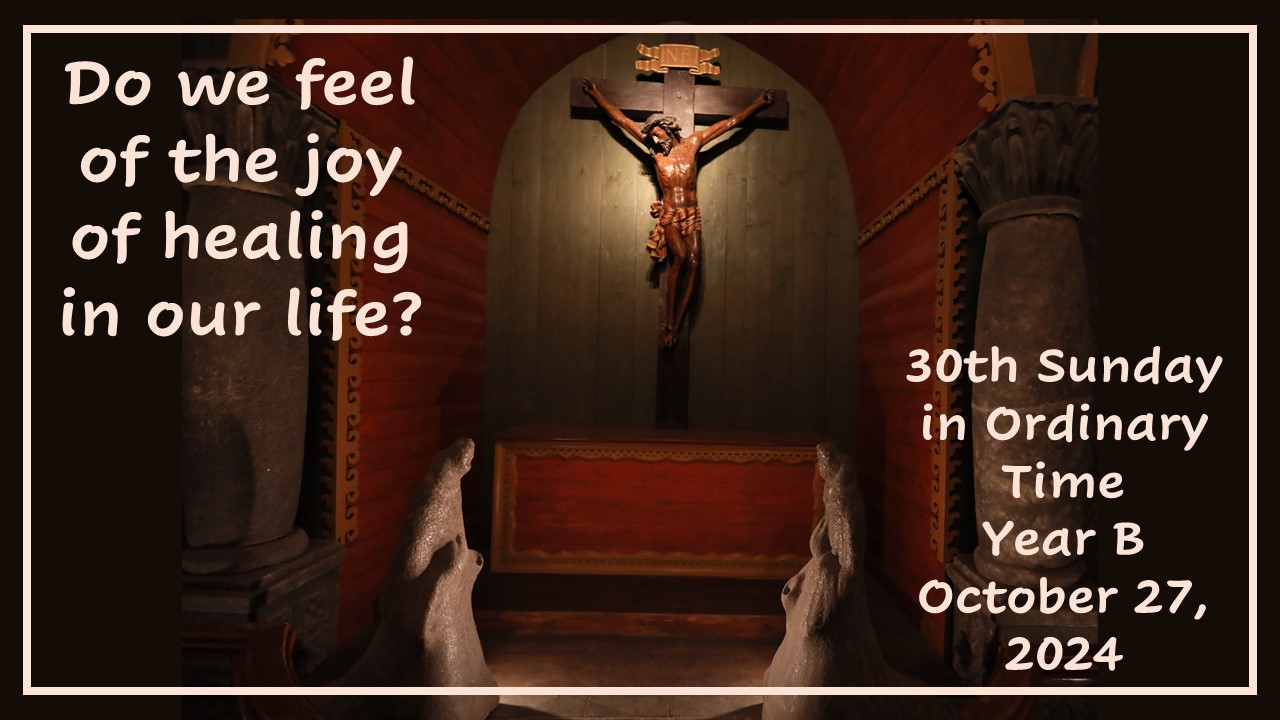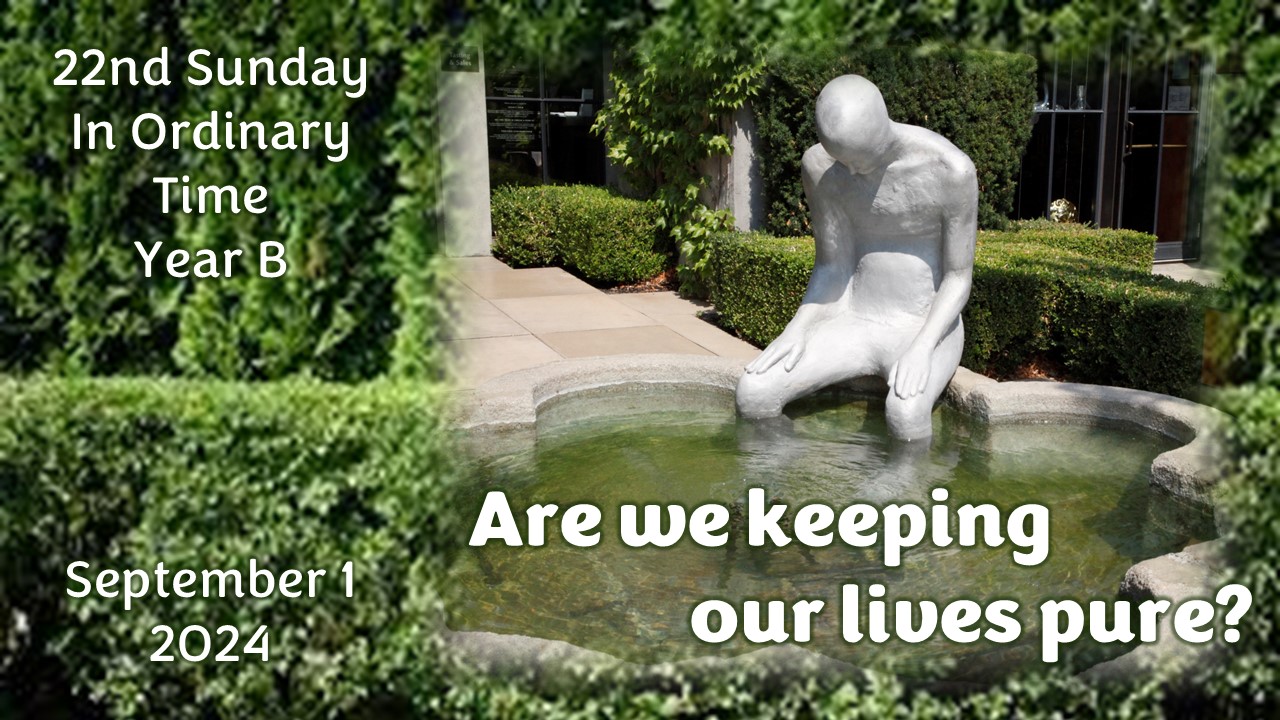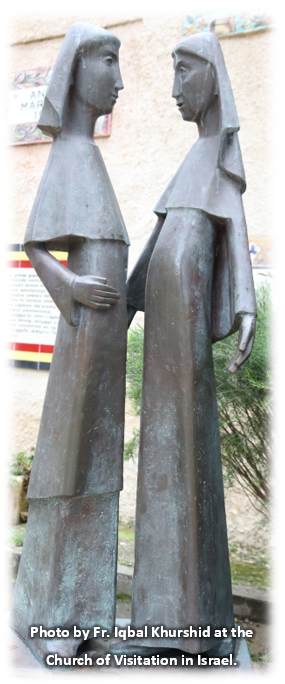
30TH SUNDAY IN ORDINARY TIME YEAR B ~ OCTOBER 27, 2024
THE JOY OF HEALING
As we conclude the month of October, the Gospel readings were so powerful and inspiring to help us to come to Jesus to learn how to inherit eternal life by serving and trusting him. Today once again we come to reflect on the Word of God which is a life-giving source and helps us to enjoy our relationships with him by following his teachings.
How do we look at our life? Where are we now compared to where we could be? How much have we enjoyed our life in Him? Someone once wrote “The life of every man is a diary in which he means to write one story and writes another; and his humblest hour is when he compares the volume as it is with what he vowed to make it.”
What should we have started last week, last month, or even last year?
Where would we be if we had started last week?
Where would we be if we had started last month?
Where would we be if we had started last year?
Where would we be if we had started five years ago?
These thoughts may be somewhat depressing but hiding from them isn’t going to help. The truth is what we must face if we’re serious about making our future better than our past. Our current position in life reflects our previous desires, planning, and choices. If we want a better future, we’ll need to make some immediate and powerful changes and choices right now. Now is the time.
St. Augustine says, “You may still want to ask why the Apostle said: We do not know what it is right to pray for, because, surely, we cannot believe that either he or those to whom he wrote did not know the Lord’s Prayer. He showed that he himself shared this uncertainty. Did he know what it was right to pray for when he was given a thorn in the flesh, an angel of Satan to bruise him, so that he might not be puffed up by the greatness of what was revealed to him? Three times he asked the Lord to take it away from him, which showed that he did not know what he should ask for in prayer. At last, he heard the Lord’s answer, explaining why the prayer of so great a man was not granted, and why it was not expedient for it to be granted: My grace is sufficient for you, for power shines forth more perfectly in weakness”.
He continues to say; “In the kind of affliction, then, which can bring either good or ill, we do not know what it is right to pray for; yet, because it is difficult, troublesome and against the grain for us, weak as we are, we do what every human would do, we pray that it may be taken away from us. We owe, however, at least this much in our duty to God: if he does not take it away, we must not imagine that we are being forgotten by him but because of our loving endurance of evil, must await greater blessings in its place. In this way, power shines forth more perfectly in weakness. These words are written to prevent us from having too great an opinion of ourselves if our prayer is granted, when we are impatient in asking for something that it would be better not to receive; and to prevent us from being dejected, and distrustful of God’s mercy toward us, if our prayer is not granted, when we ask for something that would bring us greater affliction, or completely ruin us through the corrupting influence of prosperity. In these cases, we do not know what is right to ask for in prayer. Therefore, if something happens that we did not pray for, we must have no doubt at all that what God wants is more expedient than what we wanted ourselves. Our great Mediator gave us an example of this. After he had said: Father, if it is possible, let this cup be taken away from me, he immediately added, yet not what I will, but what you will, Father, so transforming the human will that was his through his taking a human nature. Consequently, and rightly so, through the obedience of one man the many are made righteous”.
A young man once approached Socrates and asked the philosopher how he could acquire wisdom and knowledge.
“Follow me,” Socrates said in response, as he led the young man down to the sea. The young man followed as Socrates began wading through the water, first at ankle, then knee, then waist, and finally to shoulder height.
Then, rather abruptly, Socrates grabbed the young man and dunked him under the water. The young man struggled desperately and just before he blacked-out, Socrates pulled him up.
Infuriated, the young man screamed, “What are you doing?! Trying to kill me?”
Calmly, Socrates responded, “Absolutely not. If that was my intention, I would not have pulled you up.”
“Then why did you just do that?” the young man gasped.
“When you want wisdom and insight as badly as you desired that breath of air, then you shall have it,” Socrates replied while looking the man in the eyes. Then, he turned to the shore and walked away.
The joy that comes from the Lord is as important as our lives are. Having joy, includes feeling good cheer and a vibrant happiness. But joy, in its fuller, spiritual meaning of expressing God’s goodness, involves more. It is a deep-rooted, inspired happiness. According to Nehemiah “For the joy of the Lord is your strength” (Nehemiah 8:10). We also can see that in the beginning when God created Adam and Eve, he kept them in the Garden of Eden (Garden of Joy) and gave everything under their dominion. Throughout our salvation history God has been giving joy and happiness to his people who fear and believe in him. He has blessed them with every blessing and fought for them to protect them from any human or evil powers. When the Bible talks about the joy of the Lord, is it talking about the feeling and experience “Rejoice in the Lord always,” we know that we do not always have those kinds of feelings. What then is the joy of the Lord? One of the most powerful verses about joy in the Bible is Habakkuk 3:17-18. Habakkuk has just found out, by a revelation from God that his nation is going to be destroyed. The book of Habakkuk begins with a question by the prophet. He asks, “Why are your people so wicked and why do they seem to be getting away with it?” God answers him by saying, “I am aware of the wickedness of my people, and I am going to punish them by bringing an evil nation against them to destroy them.” Habakkuk is shocked by this answer and wonders how God could allow a nation even more wicked than Israel to be the instrument of God’s punishment. God answers him again and by the end of the book, Habakkuk has heard something from God that allows him to say, “Though the fig tree does not bud and there are no grapes on the vines, though the olive crop fails and the fields produce no food, though there are no sheep in the pen and no cattle in the stalls, yet I will rejoice in the Lord, I will be joyful in God my Savior.” That also is not the joy of a concert in the park, yet it exists in the most difficult circumstances and is present in the worst possible conditions. What is joy? “Joy is: A peace filled confidence about life because of the character, acts and promises of God”.
In the First Reading, Prophet Jeremiah is encouraging everyone who are suffering or being bowed down by burdens of life to “Sing aloud with gladness for Jacob, and raise shouts for the chief of the nations, proclaim, give praise, and say, “Save, O Lord, your people, the remnant of Israel”. Prophet Jeremiah is delivering a message of hope and joy to the people in a time when people are experiencing the effects of Babylonian exile. He is boosting the spirit of people up that after the suffering there going to be joy and hope which will come from the Lord; “With weeping they shall come, and with consolations I will lead them back, I will let them walk by brooks of water, in a straight path in which they shall not stumble; for I have become a father to Israel, and Ephraim is my first born”. The Psalmist adds more to it in this way “Those who go out weeping, bearing the seed for sowing, shall come home with shouts of joy, carrying their sheaves” (Psalm 126).
Moreover, the Author of Letter to Hebrews is confirming that Jesus being the High Priest is the reason of our joy which he brought to us by his sacrifice once for all. This joy only comes from the Lord by doing his will and listening to his voice because he is our Good Shepherd who leads us to into the green pastures. He leads his people with staff and rod and shows his love and mercy.
A 92-year-old man, short, very well-presented, who took great care of his appearance, was moving into an old people’s home one day. His wife of 70 years had recently died, and he was obliged to leave his home. After waiting several hours in the retirement home lobby, he gently smiled as I told him his room was ready. As he slowly walked to the elevator, using his cane, I described his small room to him, including the sheet hung at the window, which served as a curtain. “I like it very much”, he said, with the enthusiasm of an eight-year-old boy who had just been given a new puppy. May also interest you All Seniors Will Benefit from Playing These Online Games Dangers of Inhaling Hydrogen Peroxide Recommended by “Sir, you haven’t even seen the room yet. Hang on a moment, we are almost there.” “That has nothing to do with it,” he replied. “Happiness is something I choose in advance. Whether or not I like the room does not depend on the furniture, or the decor – rather it depends on how I decide to see it. It is already decided in my mind that I like my room. It is a decision I make every morning when I wake up. “I can choose. I can spend my day in bed enumerating all the difficulties that I have with the parts of my body that no longer work very well, or I can get up and give thanks to heaven for those parts that are still in working order. Every day is a gift, and if I can open my eyes, I will focus on the new day, and all the happy memories that I have made during my life. “Old age is like a bank account. You withdraw in later life what you have deposited along the way. ” For a moment, I thought about the old man’s words, and it all made sense. He made me realize that in life, we must deposit all the happiness we can in our bank account of memories. Like this, we will always have a trove of them to cherish. I would like to thank you for your part in filling my account with happy memories, which I am continuing to fill… And I remind you, that to live a happy life, you have to free your heart from hate, free your mind from worry, live simply, give more, and expect less. That’s what the wise old man lives by.
That’s same joy we can see in the life of Bartimaeus (GK- Honorable Son) son of Timaeus (Hebrews-Perfect, admirable, honorable) who is blind and sitting by the roadside. Though his father’s name is mentioned but he is nowhere to be found. In the Jewish and many more in the modern cultures, if someone is born blind, lame or disable, act was always related to sin. His excitement has stunned that crowd as he speaks out “Jesus, Son of David, have mercy on me”. Do we proclaim Jesus to other? Remember there will always be people to shut us down as we see in the Gospel today in particularly and Acts of the Apostles in general. We must continue to profess Jesus as our Lord and Saviour; “You will be my witnesses to the end of the world”.
How sad it is to see when someone with disabilities is not respected and heard? This blind man experienced the same. For such disciples, a person in need was a nuisance along the way, an obstacle unexpected and unforeseen. They preferred their own timetable above that of the Master, their own talking over listening to others. They were following Jesus, but they had their own plans in mind. This is a risk constantly to guard against. Yet, for Jesus, the cry of those pleading for help is not a nuisance but a challenge. How important it is for us to listen to life! The children of the heavenly Father are concerned with their brothers and sisters, not with useless chatter, but with the needs of their neighbours. They listen patiently and lovingly, just as God does to us and to our prayers, however repetitive they may be. God never grows tired; he is always happy when we seek him. May we too ask for the grace of a heart that listens. However, being compassionate not only calls him but also listens. I believe listening is essential to experience the joy of the Lord which opens the closed doors of our hearts, minds, and soul to come to him and speak with him. We need heart of Blessed Virgin Mary who always heard and kept everything in her heart and pondered.
Jesus not only listens but also acts and adds more to our joy; “What do you want me to do for you?” The reply of the blind should be our reply “My teacher, let me see again”. There is a joy hidden in the question of the Lord because he always keeps asking us of our needs but need to have openness like the blind. God never leaves us alone but fills us with his joy so that we may always cherish his presence in our lives. He never leaves us alone in our struggles of lives.
One night a man had a dream. He dreamt he was walking along the beach with the Lord. Across the sky flashed scenes from his life. For each scene he noticed two sets of footprints on the sand — one belonging to him and the other to the Lord. When the last scene had flashed before him, he looked back at the footprints, and he noticed only one set. He also noticed that this happened during the lowest and saddest times of his life. This bothered him and he questioned the Lord. “Lord, you said that once I decided to follow you, you would walk all the way with me, but I noticed that during the most troublesome times of my life there was only one set of footprints. I don’t understand why, when I needed you most, you deserted me.”
The Lord replied, “My precious child, I love you and would never leave you. During your times of trial and suffering, when you see only one set of footprints, those were the times when I carried you in my arms.”
Do we feel of the joy of healing in our life?
Other Sermons In This Series

22nd SUNDAY IN ORDINARY TIME YEAR B ~ SEPTEMBER 1, 2024
August 29, 2024

BRINGING JESUS TO OTHER | December 19, 2021 – 4th Sunday of Advent
December 17, 2021
21st Sunday in Ordinary Time – Year A ~ August 27, 2023
August 25, 2023

